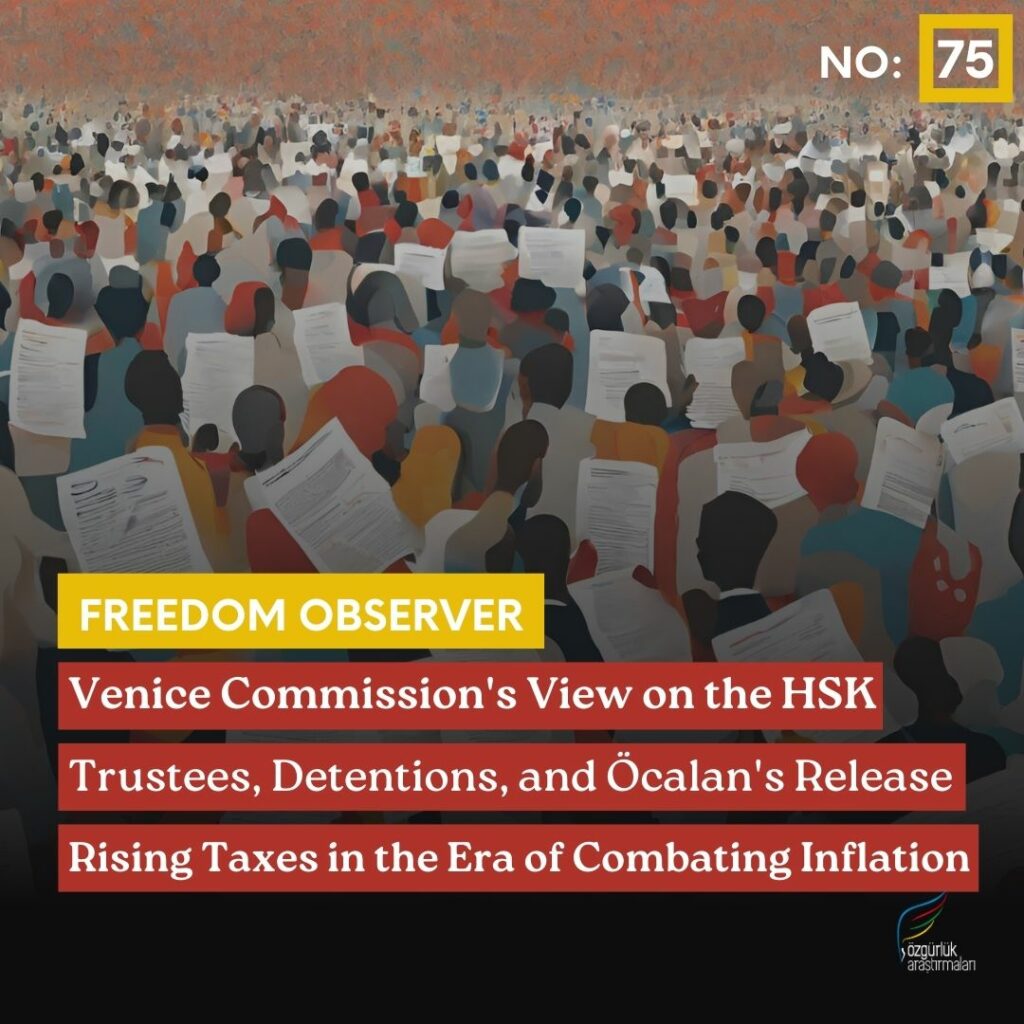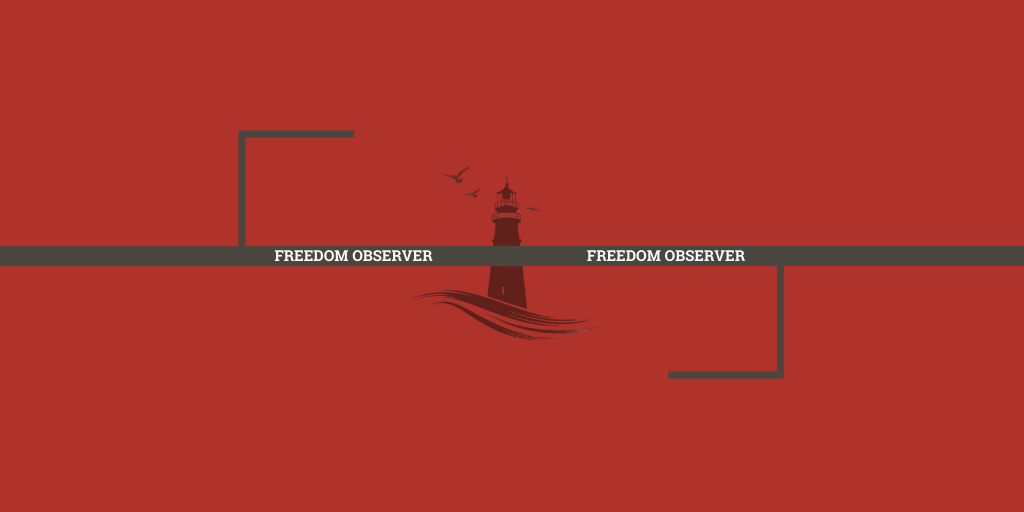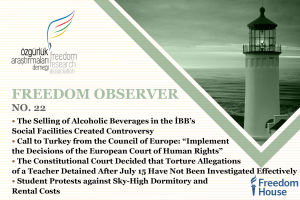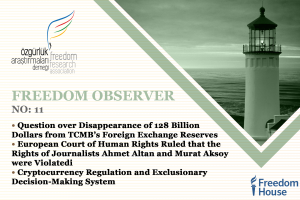
From Editor-in-Chief
Since the 74th issue of Freedom Observer, which we shared with you a month ago, the country’s principal political agenda surrounding the AKP-MHP initiative aimed at disarming and dismantling the PKK has remained unchanged. Rather than fading, the agenda sparked by MHP Chairman Devlet Bahçeli’s call in October for PKK leader Öcalan to lay down arms has only accelerated since late December.
However, while recent developments in the process — as explained below — have added some substance to this initiative, its scope and ultimate goal remain unclear. In other words, there is ongoing uncertainty about whether this process, which began with the call for the PKK to disarm, will be limited to ending terrorism or evolve into a new phase aimed at resolving the underlying issue, the “Kurdish Question,” through democratic means, of which terrorism itself is a byproduct.
Let’s first take a brief look at the latest developments on the matter: In line with Bahçeli’s revised call on November 26, a DEM Party delegation consisting of Sırrı Süreyya Önder and Pervin Buldan visited İmralı Island on December 28, after obtaining permission from the Ministry of Justice, to meet with Abdullah Öcalan. The following day, they announced the message they had received from him. As expected, Öcalan responded positively to the call. His message was notably brief:
I possess the competence and determination to contribute positively to the new paradigm strengthened by Mr. Bahçeli and Mr. Erdoğan. The delegation will share my approach with both the state and political circles. In light of this, I am ready to take the necessary positive steps and make the call.
After receiving Öcalan’s message, the DEM Party members first met with Speaker of Parliament Numan Kurtulmuş and MHP leader Devlet Bahçeli. Following these meetings, they visited other political parties to inform them about the developments and gather their views on the matter. Meanwhile, Bahçeli, in an interesting twist in his New Year’s message, stated that “this is not a new resolution process” and described the initiative as “a step taken to end terrorism.” President Erdoğan’s subsequent statements reflected the same fundamental approach.
In his speech to party members in Samsun on January 4, Erdoğan declared, “Terrorists will either bury their weapons or be buried along with them. There is no third option.” Similarly, in another speech on January 10, Erdoğan reiterated, “They will either repent of terrorism and lay down their arms, or they will not escape being eliminated. Our wish is that no more blood is shed.”
Although the two leaders agree that the primary goal of this initiative is “to end terrorism,” it has not gone unnoticed that Erdoğan’s statements are more nuanced compared to Bahçeli’s categorical assertion that the initiative is “not a new resolution process.” In both of Erdoğan’s speeches, there are subtle hints — absent from Bahçeli’s remarks — suggesting that measures could be taken beyond merely ending terrorism, potentially facilitating a peaceful resolution to the Kurdish issue.
In a context where doubts and concerns persist that the true aim of the process initiated by Bahçeli’s call for the PKK to disarm might be to secure the DEM Party’s support for a constitutional amendment or an early election decision planned by the AKP-MHP alliance, the possibility of this initiative evolving into a peaceful and democratic resolution of the Kurdish issue is undoubtedly a welcome development.
On the other hand, it is also known that the government’s project — with the immediate goal of dismantling the PKK — is partially linked to developments and dynamics in Syria. As is well-known, the Republic of Turkey views the YPG, which it considers an extension of the PKK, as a threat to its security. Turkey is actively trying to prevent the YPG, with U.S. support, from becoming an autonomous political entity in the new Syria. Reflecting this stance, Foreign Minister Hakan Fidan mentioned the possibility of a military operation against the YPG during an interview on CNN Türk on January 7. Fidan stated: “PKK cadres need to leave the country… If you don’t want a military operation, the conditions for that are clear.”
Meanwhile, Foreign Minister Hakan Fidan made a surprising statement on January 11, casting doubt on the realism of the expectation that the PKK would disarm following Öcalan’s instructions. Fidan raised the possibility that the PKK might show strong resistance to orders from its leader (Öcalan), stating, “We are moving forward with realistic calculations, not hypothetical assumptions.” What is striking here is not the existence of this possibility—already well-known to those familiar with the issue—but the fact that it was openly acknowledged by a high-ranking official who previously served as the head of the National Intelligence Organization (MİT). At this point, there is insufficient data to assess the political implications of such a statement.
Finally, the AKP-MHP initiative to disarm the PKK with Öcalan at its center and the emerging possibility of this initiative culminating in a new “Resolution Process” has visibly unsettled the opposition İYİ Party. However, more noteworthy is the main opposition CHP’s hesitant and skeptical stance regarding the initiative. While the CHP leader’s suspicions—that the AKP-MHP coalition has a “hidden agenda” behind this initiative, aiming to secure the DEM Party’s support for a constitutional amendment and/or early elections—are not unfounded, a more fitting approach for the main opposition party would be to focus on crafting a positive project. Such a project should concentrate on the correct policies to pursue and the concrete measures to be taken regarding such a critical issue.
While Özgür Özel is right to call for the involvement of Parliament and to highlight the contradiction in the government initiating this process while continuing its practice of appointing trustees, the same cannot be said for his populist suggestion of including representatives of martyr families in the proposed “executive” (!) Commission. This could lead the issue into a deadlock. Even more perplexing is Özel’s proposal that a consensus on the resolution be formed in Parliament based on the CHP’s “founding values.” The very root of the Kurdish issue lies in the uncompromising implementation of those “founding values” in the past.
In this issue, A. Rıza Çoban examines the Venice Commission’s critical report on the structure of the Council of Judges and Prosecutors, Ö. Faruk Şen draws attention to the contradictions and unlawfulness in the government’s trustee policies, and Caner Gerek provides an economic analysis of the government’s anti-inflation policies and the measures taken within this framework.
See you in the next issue of Freedom Observer.
* Prof. Dr. Mustafa Erdoğan
Venice Commission’s View on the HSK
One of the fundamental safeguards of the rule of law is undoubtedly the presence of an impartial and independent judiciary. The equal application of the law to all citizens can only be ensured through judicial independence. While judicial independence has always been a challenge in Turkey, the executive’s control over the judiciary has become increasingly evident over the past decade, particularly after the 2017 constitutional amendments. Judicial independence has also been a key focus since Turkey was placed back under monitoring by the Parliamentary Assembly of the Council of Europe (PACE).
Within this framework, the Chair of the PACE Monitoring Committee formally requested an opinion from the Venice Commission on April 18, 2024, regarding the structure of the Council of Judges and Prosecutors (HSK) and the procedures for electing its members.[1] The Venice Commission adopted the opinion, prepared by rapporteurs, during its 141st Plenary Session on December 6–7, 2024. Comprising 123 paragraphs, the opinion thoroughly examined the HSK’s structure, the sources and selection processes of its members, its functioning and powers, as well as the composition and authorities of its Inspection Board and General Secretariat.
The Venice Commission emphasized that, according to European standards, at least half of the members of a judicial council should be judges elected by their peers. It highlighted that none of the members of the HSK are elected by judges and prosecutors, which is inconsistent with these standards. The Commission underscored that the purpose of having council members elected by judges is to protect the judiciary from political interference, ensuring that the judicial members of the Council represent only the perspective of the community of judges and prosecutors. Additionally, it noted that the selection of non-judicial members is intended to strengthen the Council’s external legitimacy and mitigate the negative effects of corporatism, thereby achieving a pluralistic and democratically legitimate composition.
The Venice Commission noted that while eight members of Turkey’s HSK are judges or prosecutors, they are not elected by their peers but rather appointed by the executive and legislature. It acknowledged that these eight members are determined based on political preferences, which means they cannot truly be said to represent the judiciary. Taking into account the President’s position after the 2017 constitutional amendments, the Commission emphasized that at least ten of the HSK’s 13 members are effectively chosen by the executive, resulting in significant political influence over the judiciary.
In response, the Venice Commission recommended that at least half of the HSK members be elected by judges and prosecutors from various levels of the judiciary. It also advised that constitutional and legal amendments be enacted to establish a system ensuring adequate diversity in terms of gender, minorities, and geographic representation. Furthermore, the Commission proposed the removal of the Minister of Justice and the Ministry’s Undersecretary from the HSK.
The Venice Commission recommended increasing the total number of HSK members as well as the number of non-judicial members selected by the Parliament. It also advised the introduction of legislative amendments to prohibit the selection of candidates with clear political ties to the executive or legislative branches. Additionally, it suggested that organizations such as the Bar Association and universities should conduct a pre-selection process for candidates to be elected by the Parliament through a Joint Committee.
The Commission proposed guaranteeing the tenure security and functional immunity of HSK members through constitutional and legal safeguards. It recommended that grounds for dismissal and sanctions be narrowly and clearly defined, explicitly excluding reasons unrelated to the exercise of judicial duties.
Furthermore, the Commission advised ensuring that the HSK Chairperson is an impartial individual elected by the members themselves, limiting the Chairperson’s powers, and subjecting all Council decisions to judicial review. It also called for the elimination of personnel transfers between the Ministry of Justice and the Council, preventing political influence over appointments of the General Secretary, inspectors, and rapporteur judges and increasing the transparency of the Council’s internal operations.While the Commission’s findings and recommendations are essential for an independent Council and judiciary, it is currently unrealistic to suggest that the political will necessary to implement these changes exists in Turkey today.
* Doç. Dr. Ali Rıza Çoban – Constitutional Lawyer
Trustees, Detentions, and Öcalan’s Release
On January 10, Friday, in Mersin’s Akdeniz district, DEM Party Co-Mayors Nuriye Arslan and Hoşyar Sarıyıldız, who won the municipality with 37% of the vote in the March 31, 2024 local elections, were detained, and a trustee was appointed in their place. Once again, trustee practices became a central issue in Turkey’s democratic political environment. The detentions occurred as part of an investigation involving allegations of “spreading terrorist propaganda” and “violating anti-terror financing regulations.” Previously, trustees had been appointed to the Hakkari Municipality and CHP-led Esenyurt Municipality, followed by similar actions in Mardin Metropolitan, Batman, and Halfeti municipalities, bringing the total number of removed mayors to five. With Akdeniz Municipality added, this number has now risen to six.
In a statement, DEM Party described the detentions as a political operation, emphasizing that this intervention in the will of the people is a continuation of the “trustee mentality.” Similarly, CHP and other opposition parties condemned the incident as an act of “tyranny” and labeled it a blow to democracy.
But how can the continuation of trustee appointments and detentions be explained during a period when negotiations between the DEM Party and the ruling bloc over Abdullah Öcalan’s release and PKK disarmament are ongoing? Isn’t this a contradiction? Developments so far suggest two possibilities. On the one hand, the government seems intent on continuing the negotiations initiated by Devlet Bahçeli while simultaneously increasing pressure on the DEM Party to strengthen its bargaining position. On the other hand, it’s possible that Erdoğan and the AKP, who have never fully embraced or publicly debated this process, are making these moves despite ongoing negotiations. Indeed, when examining the positive tone of Bahçeli’s speech following the appointment of a trustee to replace Ahmet Türk—a figure Bahçeli has previously expressed respect for—it becomes evident that not everything in this process is being carried out under a unified plan or in a consistent manner.
Regardless of how these developments fit into the broader negotiations, one fact remains clear: trustee practices that narrow the space for democratic politics further normalize interventions in the people’s will, leading to greater erosion of democratic values in Turkey.
* Dr. Ömer Faruk Şen– Missouri University
Rising Taxes in the Era of Combating Inflation
Since October 2021, the Turkish economy has been grappling with inflation and the economic damage it has caused. Although topics like foreign policy occasionally dominate the agenda, the sharp decline in purchasing power—particularly among the lowest-income groups—remains the most pressing issue. Combating inflation relies on two primary tools: monetary policy and fiscal policy. While monetary policy has been implemented stringently since the 2024 local elections, fiscal policy has seen insufficient steps taken to address inflation. The lack of coordination between these two tools has negatively impacted efforts to fight inflation. At the core of this dissonance lies the inability to control budget expenditures within fiscal policy.
Although it may seem contradictory to the previous point, it can still be argued that disciplined fiscal management exists. Fiscal discipline has been one of the most defining economic features of the AK Party era. Despite adverse factors such as the economic downturn and the earthquake, budget discipline continues to be maintained. Thanks to this continuity, the public budget deficit in 2025 is expected to be 3.1% of the national income—a figure quite close to the 3% threshold set by the Maastricht Criteria, which Turkey once aimed to meet as part of its EU aspirations.
This seemingly paradoxical situation is explained by a key factor: despite high public expenditures, balance is maintained through equally high tax revenues. Although it would be possible to achieve lower public spending and revenue levels, economic management has opted to keep both at elevated levels. The main driver of this elevated balance is the inability to control public expenditures. Unable to cut spending, the government is forced to increase tax rates to boost revenue.
The increase in taxes has two adverse effects on inflation. First, rising public expenditures fail to reduce demand sufficiently, preventing inflation from declining rapidly. Second, high tax rates push up the prices of goods and services, driving inflation higher. In this context, the revaluation rate for public service prices being set at a high level of 43.93% further limits the decline in inflation. Additionally, some public services previously financed through direct and indirect taxes have recently been subjected to new charges. The two latest examples of this can be seen in last week’s decisions.
The first of these decisions involves the Revenue Administration’s new policy of charging fees for inquiries made by legal entities such as companies, chambers, bar associations, and notaries[2]. For instance, the fee for a balance sheet inquiry can go up to 518 TL. This means that inquiries, which were previously financed through existing taxes and should have been covered as such, now require additional payments as if public taxes were not already funding them. The second decision concerns charging fees for certain health reports. For example, citizens seeking a driver’s license report will now have to pay a separate service fee specifically for the report, in addition to the taxes they already pay.[3] These measures suggest an approach that resembles the re-taxation of nearly every service to fund public expenditures. The economic administration anticipates that tax revenues will increase significantly, exceeding the expected inflation rate in 2025. It projects that these revenues will rise by 46.5%, reaching 11.139 trillion TL.
The sharp increases in public revenues and expenditures, as outlined above, complicate efforts to combat inflation and place a heavier burden on the Central Bank. Lacking sufficient support from the public sector, the Central Bank is compelled to maintain the exchange rate at its current levels for a longer period to fight inflation. This, in turn, leads to the spread of price anomalies—arising from the appreciation of dollar-based products—across broader segments of the economy, disrupting the balance. Additionally, the inability to reduce public expenditures negatively impacts inflation expectations. However, the high level of public spending does not only affect inflation. While public revenues represent an expense for taxpayers, public expenditures serve as a source of income for other groups. Considering the inefficiency of public spending, the effectiveness of this resource transfer is highly questionable. These issues collectively push us further away from a market economy, steering the system toward one where income and income distribution are centrally determined from the top.
* Dr. Caner Gerek
1 Venice Commission, Türkiye – Opinion on the composition of the Council of Judges and Prosecutors and the procedure for the election of its members, adopted by the Venice Commission at its 141st Plenary Session (Venice, 6-7 December 2024) CDL-AD(2024)041-e
https://www.venice.coe.int/webforms/documents/?pdf=CDL-AD(2024)041-e
2 https://www.ekoturk.com/haberler/gelir-idaresindeki-sorgular-ucretli-oldu-iste-en-dusuk-sorgulama-ucreti/
3 https://www.ekonomim.com/gundem/ayakta-tedavide-katki-payi-10-kat-artirildi-aile-hekiminden-alinacak-bazi-raporlar-artik-ucretli-haberi-791970





